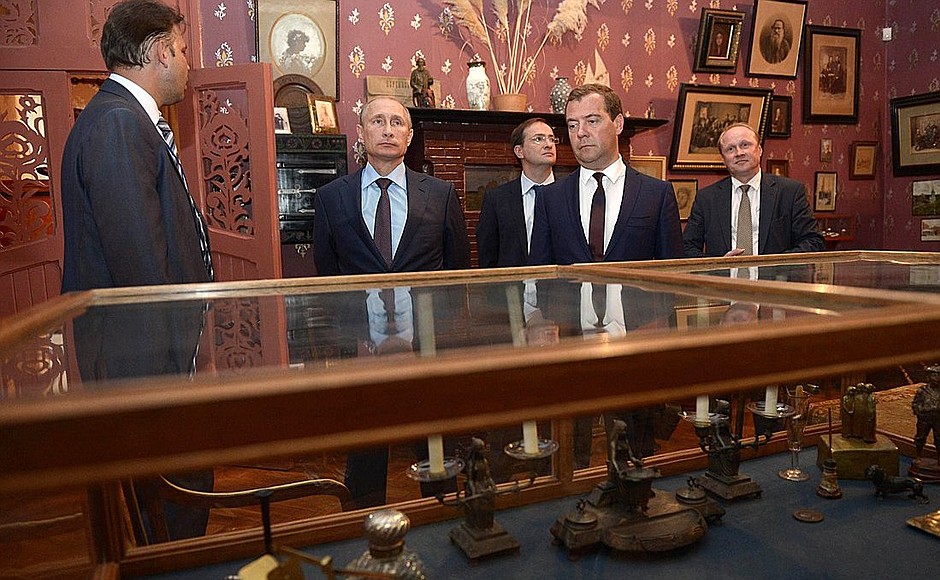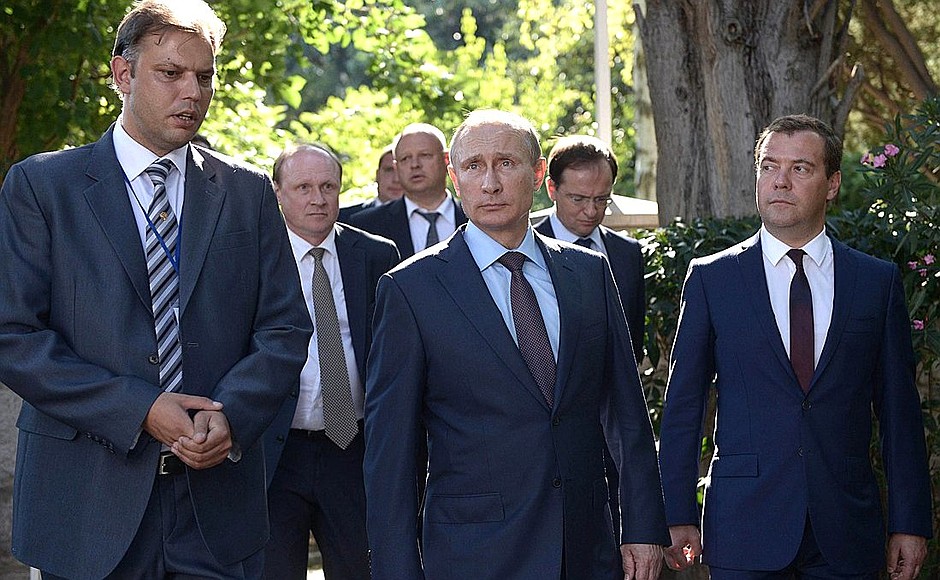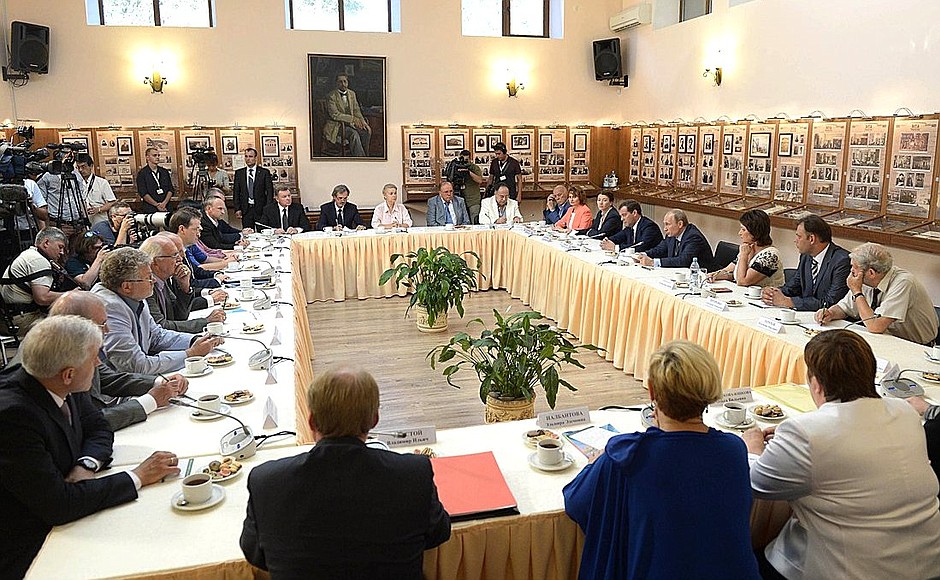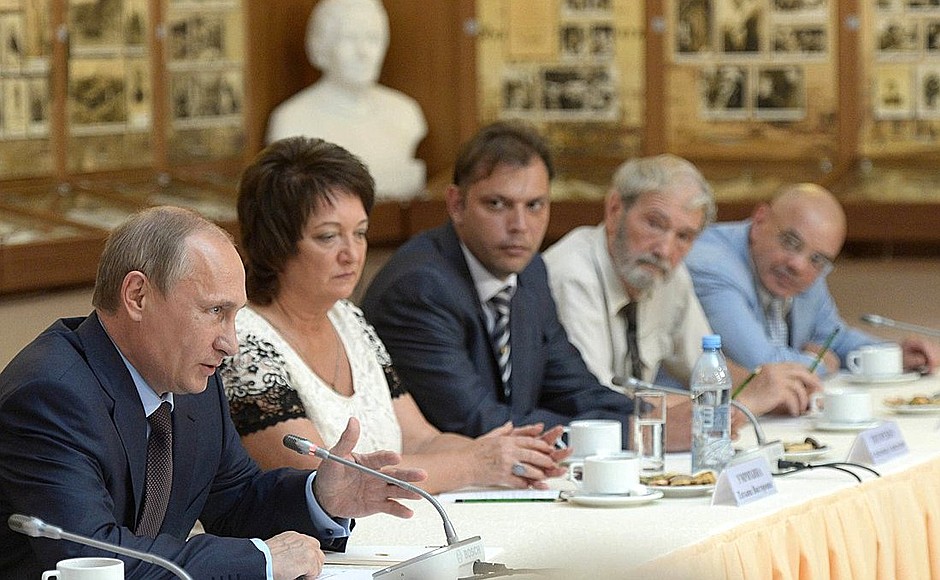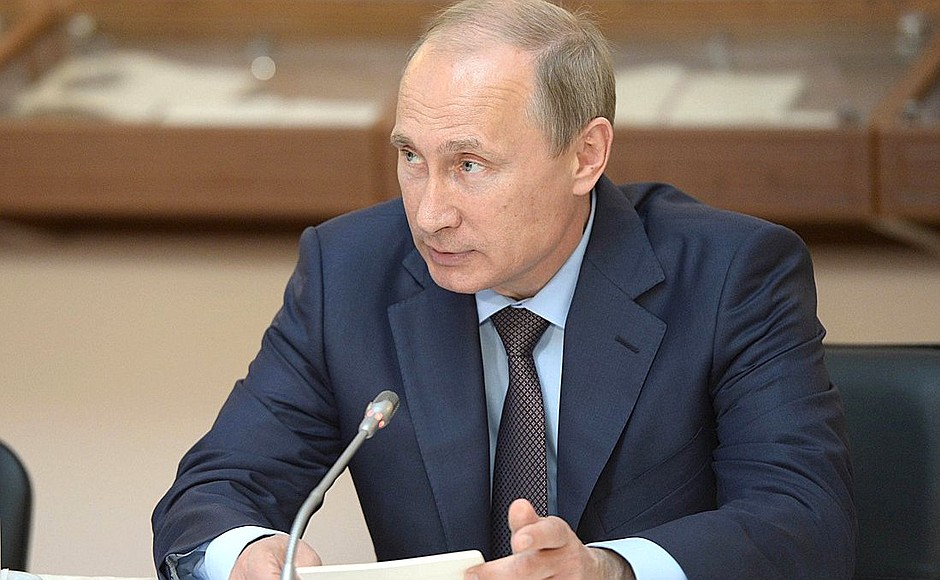The meeting was dedicated to integrating the republic of Crimea into the cultural life of the Russian Federation.
* * *
Extracts from transcript of meeting with cultural figures
President of Russia Vladimir Putin: Good afternoon, friends,
I am very happy to see you, especially here in Crimea. For creative people, for those who know and value Russian literature, art, music and cinematography, Crimea is a place of special importance. Its history is connected with a great number of outstanding masters.
Our hosts were kind enough to show us around this museum and tell us about Chekhov. However, he is not the only classic Crimea has a connection with. Among the others are Pushkin, Tolstoy, Gorky, Aiavazovsky and many other masters of culture.
Crimea was a special place for Anton Chekhov. I wanted us to meet here so that we could remember the cultural and historic heritage of Crimea, which is inseparably linked to the culture and history of Russia.
As you know, there is another unique museum in Crimea – the home of artist and poet Maximillian Voloshin in Koktebel, which has become a spiritual and creative centre not only in the Silver Age of Russia, but also for the culture of the Soviet period. Whatever happened in Crimea in the past decades, it was always part of Russian culture, history and our national heritage. Undoubtedly, this cultural, historic and spiritual unity and kinship played a very important role in the choice made by the people of Crimea in March.
We are now integrating the Republic of Crimea and Sevastopol into Russian legislation, economy and the social sphere. We have drafted a federal targeted programme for the socioeconomic development of Crimea and Sevastopol through 2020.
We have just had a meeting with State Duma deputies. I told them that 700 billion rubles [around $19.5 billion] are being allocated for this purpose. Naturally, we proceed from the assumption that part of that money has to be spent to resolve the issues we will discuss here at this meeting.
The entire programme is aimed primarily at resolving the most acute and sensitive issues that concern the residents of the two new entities of the Russian Federation. The main goal of the programme is to reach national standards here in Crimea, to provide conditions for sustainable development of the region and to implement its huge potential.
We should very fairly give special attention to developing tourism. However, I would like to stress here that the revival of the traditional fame of Crimea as a unique resort, a traveller’s dream of sorts, should not be limited to mere modernisation of the existing infrastructure and hotels, though this is also essential. Crimea should have modern restaurants, hotels and so forth. However, only the cultural and historic heritage of Crimea creates its true spirit, is its true attraction and unique feature.
A rich cultural life, filled with theatrical premiers, festivals and other creative projects will help make Crimea as famous and attractive as it used to be and will help restore its significance in the cultural life of the country.
All of this could become one of Crimea’s competitive advantages, not just on the Russian domestic tourism market, but on the international market too. There are around 9,000 monuments here that merit being included in the Unified State Register of Russia’s Cultural Heritage Sites, and the experts say that this is not the final figure. It was not without reason that Alexander Griboyedov called Crimea a natural history museum that has preserved the secrets of millennia. Crimea has a unique and rare archaeological environment, as the historians know, and I am sure that many new discoveries still await us.
Of course, our policy in Crimea should not stop at studying the ancient times and preserving cultural sites. One of our priorities is to support the different ethnic cultures and traditions in Crimea. Crimea is a mirror of multi-ethnic Russia, and here, like everywhere in our country, it is extremely important to maintain peace and harmony and a balance of interests between the different ethnic groups. As you know, we have begun the process of rehabilitating the repressed peoples of Crimea and have given equal legal recognition to three languages – Russian, Ukrainian and Crimean Tatar.
We still have much to do to preserve and develop Crimea’s diverse cultural and historical potential. In this work we hope for the support of Russia’s cultural communities, all the more so as direct contacts between cultural figures in Crimea and Russia continued uninterrupted throughout these past years.
Russia has put in place a solid system for supporting culture. We all know, especially you, that we still have many problems in this area, but we have nonetheless set some standards and are making progress. The relevant establishments in Crimea and Sevastopol should also be integrated into this system. This is especially true of the Khersones Tavrichesky museum and nature reserve and the museum of the defence of Sevastopol with its famous panorama by Franz Roubaud, which will mark its 110th anniversary next year.
We also need to support and develop the Yalta film studio. It is one of the oldest in Russia and the world and is linked to some of the most vivid pages in Russia’s cinematographic history. The famous actor Georgy Millyar was said to have joked that Yalta was purely a movie town, temporarily taken over by holidaymakers. It would be good if we could return some of that former glory to Crimea. The Crimea authorities have already asked the Russian Cinematography Union for help. We will talk today about the steps already taken, but I know that some of the problems here are purely of a material nature.
Our task is to ensure that Crimea and its people are fully integrated into Russia’s cultural space, and guarantee that the people of Crimea and Sevastopol have equal access to everything that Russia can offer in terms of cultural opportunities.
Last month, a law was signed that will rapidly integrate Crimea’s people into the Russian system for developing fitness and sport. I think the next step would be to pass a similar law for culture, the arts and education.
As far as education goes, much work is already underway in this area. Teachers in Crimea’s schools and universities spent the summer preparing to teach using the new Russian national curriculum. The Government and the Russian Historical Society were instructed to draft a new concept for teaching Russian history that includes the importance of Crimea and Sevastopol for our country. In this respect, I want to draw your attention to one other matter.
At the meeting with the State Duma deputies today, which I already mentioned, we spoke a lot about the special place Crimea holds in our country’s history, including during the Civil War, when our nation was split into whites and reds. We all see that Crimea’s reunification with Russia has created a real patriotic surge and consolidated our society. We all realised that we share the same common destiny, no matter what our political views.
In September this year, Crimea will host a military history festival. Military-patriotic societies and re-enactment clubs will take part and will present various eras in our country’s military history, from the ancient Slavs through to the soldiers of the Civil War and the Great Patriotic War. The people taking part in this project all share a love of Russian history and pride in our country’s military glory. We will of course support these kinds of educational and patriotic initiatives, and I ask you to support them too.
As I said, Crimea and Sevastopol, with their great history, cultural treasures and military glory, can become not just centres for preserving our national memory and culture and contributing to our young people’s patriotic education, but can play a unique, unifying role and help to heal the wounds inflicted by the 20th century’s dramatic events, restore our history’s integrity and rebuild the links between eras and generations.
Friends, I ask you as cultural figures and everyone involved in the culture sector to use your influence, talent, knowledge and creative ability to help us make progress in this work, including our efforts to strengthen cultural and creative ties with compatriots abroad. I think that this would also play a big and positive role.
<…>
Vladimir Putin (responding to a question from Director of Bakhchisarai Historical and Cultural Reserve Elmira Ablyalimova on allowing Mustafa Dzhemilyev and Refat Chubarov to return to Crimea): As far as various bans go, I am not a supporter of such bans, but support dialogue. At the same time however, we need to do our best to ensure that people do not try to freeload on past problems, but think about the future and try to work in a positive spirit.
As you know, we took steps to rehabilitate the repressed peoples, the Crimean Tatars, Greeks, Germans, and all peoples who suffered during Stalin’s repressions. We take this very seriously and see this not as an affair of the past, but as a matter for our present and future.
All peoples in Crimea should know that they are absolutely equal, and this is why we decided to give the languages here equal status as official languages. This is the case for Crimean Tatar, Russian and Ukrainian.
Another absolutely vital matter is that we need to move from simply talking about having everyone in Crimea feel at home in this land, with decent conditions for life, to actually making this the case and improving the social and economic situation in the areas largely settled by Crimean Tatars.
People here know that the living conditions in the region are far from always worthy of 21st-century Europe, and so we have a lot of work ahead to change this. I just want to say one thing. We will work with absolutely everyone who wants the good of Russia’s peoples, including the Crimean Tatars here in Crimea. But we will not work with those who speculate on the past’s problems, make it their profession and livelihood, and use past problems for their own PR. We will not work with these people.
But we will work with everyone who has a positive attitude, even if they are critical of us. We are only just beginning to implement the programmes I spoke about, and so there is still cause to criticise us today. But we will take such criticism in our stride and treat it with respect if colleagues or members of the public bring to our attention what we are doing wrong, where we not acting in accordance with agreements, or where the plans we announced have not been carried out or not implemented as they should have been. We will take such criticism as something perfectly normal and even positive, and we will engage in dialogue with all who really want to work and not just use past problems for their PR.
As for Bakhchisarai and the whole centre that you run, I totally agree that this is a very important part of the cultural life of Crimea and all of Russia, and it does need our attention.
<…>
Vladimir Putin (responding to a statement by director of the Kerch Historical and Cultural Reserve Tatyana Umrikhina): As for your area of responsibility, archaeology, particularly in Kerch, this is a very interesting and important territory, from a professional point of view. The reason I want to highlight it is that we are planning to build some major infrastructure facilities here – new roads, bridges, as you know, and so on. Some of them will pass across the Kerch peninsula.
Here, we need to move forward very carefully, treating the historical heritage with great respect. We must address issues related to infrastructure projects and the preservation of cultural heritage in advance, together with experts, with you, with representatives from the Hermitage and other experts – jointly, and promptly. This is a sensitive matter because we do need to build roads, but here, wherever you go, there are cultural heritage sites everywhere. It’s true, and it’s a serious matter. So we will need to coordinate these efforts.
First and foremost, this concerns the places where we will build motorways. We have agreed with the Government that we will build new motorways and rebuild old ones.
I was in Sevastopol yesterday; I was leaving, but I had forgotten something and I called my colleagues and said, “Listen, you haven’t forgotten the city road network, have you?” And they said, “No, no, no.” Today, they came and said, “We have allocated 12 billion rubles towards the road network in major Crimean cities.” These include Sevastopol, Simferopol and several other cities. And we will begin implementing this in the autumn. But we certainly cannot forget about this as we build new facilities and modernise old infrastructure. We will work together with you.
<…>
Vladimir Putin: Friends, unfortunately, I need to draw our meeting to a close, so forgive me if you have not had a chance to speak. I think we were able to discuss Crimea’s cultural problems in great depth and this meeting was not held in vain, because after our meeting, I will be looking at many issues from a new angle – and I’m sure Mr Medvedev and the Culture Minister will be, as well.
Crimea is an absolutely unique place in terms of our common history and global culture. It is no accident that there are sites here that are included on the UNESCO cultural heritage list. That is the reason we are talking about heritage that we inherited from previous eras and previous inhabitants of this territory. We must treat all of it carefully and use it as a foundation for our own development in the long-term historical perspective.
It would certainly be impossible to do this without significant material support. As I already said, perhaps the most important outcome of our meeting will be more than just meeting one another, but also the launch of a culture support programme in Crimea that is to address different areas: art, music, theatre and literature.
I will ask the Minister for this work to be conducted together with the heads of federal regions and representatives of creative unions, as well as the public, so that you can let us know what your priorities are, what we should do and in what order, and if we need to provide some additional resources.
I want to thank all of you for today’s meeting and wish you every success.
Thank you very much.
